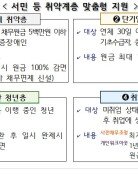Government Lowers Growth Target to Four Percent
Government Lowers Growth Target to Four Percent
Posted July. 05, 2005 02:28,
The government revised downward its goal for this years economic growth to around four percent from five percent and significantly lowering its job creation target to 300,000 new jobs from 400,000.
It decided to work for economic vitalization by injecting an additional 6.4 trillion won3.1 trillion won in the public sector and 3.3 trillion won in private funding in the latter half of this year.
The government and the ruling Uri Party discussed projected trends of the economy in the second half and plans for managing the economy in a government-ruling party conference held on the morning of July 4.
The government and the ruling party lowered this years economic growth prospects from five percent to around four percent based on internal and external conditions, such as high oil prices, slow export growth and sluggish investment in facilities.
The Ministry of Finance and Economy explained that around four percent means it could drop into the three-percent range.
Han Duck-soo, deputy prime minister and minister of finance and economy, said, A growth rate of around three percent is expected in the second quarter (April to June), and four-to-five-percent growth is likely in the second half, suggesting that he estimates this years growth rate at around 3.5 to four percent.
The governments job creation target was reduced from 400,000 jobs to 300,000. To create 400,000 new jobs annually, an average of 400,000 people should be added to the payrolls every month. However, the monthly average growth in employment has stayed at a mere 229,000 people in the first five months of this year.
Against this backdrop, the government and the ruling party agreed to make revitalization of investment a top policy priority in order to realize economic stimulation in the latter half of the year.
For starters, the government is planning to make an additional investment of 3.1 trillion won from public corporations and public funds because the government has insufficient financing capacity in the second half as a result of frontloading of its capital in the first half. Eight public funds, including the National Housing Fund, are expected to invest an additional 1.1 trillion won, while five public corporations, including the Korea National Housing Corporation, will invest two trillion won more.
They also said that about 3.3 trillion won of private capital will be invested: two trillion won in the Comprehensive Investment Plan, designed to build schools and welfare facilities with private money, and 1.3 trillion won in private investment projects, such as roads and ports.
However, they agreed that it is hard to make a decision on drafting a revised supplementary budget at the moment, since it requires a clear understanding of the need for drafting one and the forming of a national consensus.
An official at the Ministry of Finance and Economy explained, We decided to focus on expanding consumption in the public sector and improving the corporate environment at the moment, rather than revising the supplementary budget.
The government is planning to announce a finalized economic management plan for the latter half of the year at a meeting on examining the economy and peoples livelihoods scheduled for July 6.
Chi-Young Shin Myoung-Gun Lee higgledy@donga.com gun43@donga.com






